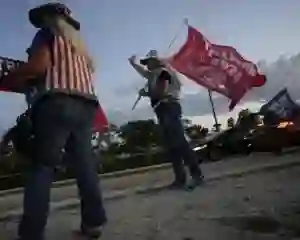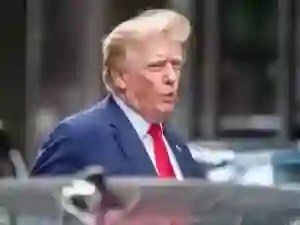Donald Trump has been indicted by a Manhattan grand jury, a historic reckoning after years of investigations into his personal, political, and business dealings and an abrupt jolt to his bid to retake the White House.
The exact nature of the charges was unclear Friday because the indictment remained under seal, but they stem from payments made during the 2016 presidential campaign to silence claims of an extramarital sexual encounter. Prosecutors said they were working to coordinate Trump’s surrender, which could happen early next week. They did not say whether they intended to seek prison time in the event of a conviction, a development that wouldn’t prevent Trump from seeking and assuming the presidency.
The indictment, the first against a former U.S. president, injects a local district attorney’s office into the heart of a national presidential race and ushers in criminal proceedings in a city that the ex-president for decades called home. Arriving at a time of deep political divisions, the charges are likely to reinforce rather than reshape dueling perspectives of those who see accountability as long overdue and those who, like Trump, feel the Republican is being targeted for political purposes by a Democratic prosecutor.
Trump, who has denied any wrongdoing and has repeatedly assailed the investigation, called the indictment “political persecution” and predicted it would damage Democrats in 2024. In a statement confirming the charges, defense lawyers Susan Necheles and Joseph Tacopina said Trump “did not commit any crime. We will vigorously fight this political prosecution in court.”
A spokesman for the Manhattan district attorney’s office confirmed the indictment and said prosecutors had reached out to Trump’s defense team to coordinate a surrender. Tacopina said Trump is “likely” to turn himself in on Tuesday.
“We’re working out those logistics right now,” Tacopina said on NBC’s “Today” show Friday morning. “He’s not gonna hole up in Mar-a-Lago.”
Tacopina insisted that Trump would not take a plea deal: “There’s no crime.”
Trump was asked to surrender Friday but his lawyers said the Secret Service needed additional time as they made security preparations, two people familiar with the matter told The Associated Press. The people spoke on condition of anonymity because they couldn’t publicly discuss security details.
District Attorney Alvin Bragg left his office Thursday evening without commenting.
The case centers on well-chronicled allegations from a period in 2016 when Trump’s celebrity past collided with his political ambitions. Prosecutors for months scrutinized money paid to porn actor Stormy Daniels and former Playboy model Karen McDougal, whom he feared would go public with claims that they had extramarital sexual encounters with him.

The timing of the indictment appeared to come as a surprise to Trump campaign officials following news reports that criminal charges were likely weeks away. The former president was at Mar-a-Lago, his Florida estate, on Thursday and filmed an interview with a conservative commentator earlier in the day.
For a man whose presidency was defined by one obliterated norm after another, the indictment sets up yet another never-before-seen spectacle — a former president having his fingerprints and mug shot taken, and then facing arraignment. For security reasons, his booking is expected to be carefully choreographed to avoid crowds inside or outside the courthouse.
The prosecution also means that Trump will have to simultaneously fight for his freedom and political future, while also fending off potentially more perilous legal threats, including investigations into attempts by him and his allies to undo the 2020 presidential election as well as into the hoarding of hundreds of classified documents.
In fact, New York was until recently seen as an unlikely contender to be the first place to prosecute Trump, who continues to face long-running investigations in Atlanta and Washington that could also result in charges. Unlike those inquiries, the Manhattan case concerns allegations against Trump that occurred before he became president and are unrelated to his much-publicized efforts to overturn the election.
The criminal charges in New York are the latest salvo in a profound schism between Trump and his hometown — a reckoning for a one-time favorite son who grew rich and famous building skyscrapers, hobnobbing with celebrities and gracing the pages of the city’s gossip press.
Trump, who famously riffed in 2016 that he “could stand in the middle of Fifth Avenue and shoot somebody” and “wouldn’t lose voters,” now faces a threat to his liberty in a borough where more than 75% of voters — many of them potential jurors — went against him in the last election.

